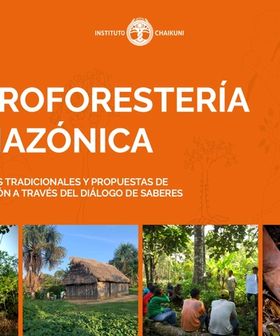In 2018 we began working with local communities offering them technical assistance and inputs for the installation of their own diverse agroforestry plots (or chacras integrales, as we call them). This experience made us witness the potential of Amazonian agroforestry as a productive alternative for communities, which at the same time contributes to the regeneration of ecosystems, the revaluation of local knowledge and the empowerment of indigenous peoples, improving their well-being.
Chaikuni's agroforestry knowledge and model has been importantly enriched over the years through dialogue and knowledge exchange with indigenous elders, bilingual intercultural teachers and community members of the Bora, Shawi and Kukama-Kukamiria peoples, mainly, as well as our local partners which share our vision and commitment.
All the above is reflected in our latest publication, "Amazonian Agroforestry: Traditional Practices and Proposals for Innovation through Knowledge Dialogues", which aims to provide an overview of the potential of Amazonian agroforestry as an alternative for food sovereignty, ecosystem regeneration and community well-being, while at the same time being a viable and important climate solution.
The publication outlines some lines of work that we hope may generate debate among policy makers, public and private project promoters, indigenous federations, communities, academic institutions, grassroots organizations etc., allowing to build, expand and promote Amazonian agroforestry models that are rooted in ancestral knowledge, capable of responding to the challenges and aspirations of the Amazonian peoples.
*For the moment, this publication is only available in Spanish. Soon, we will upload the English version.


